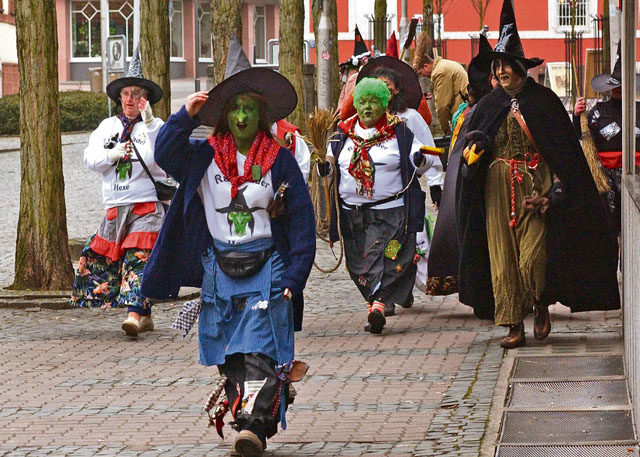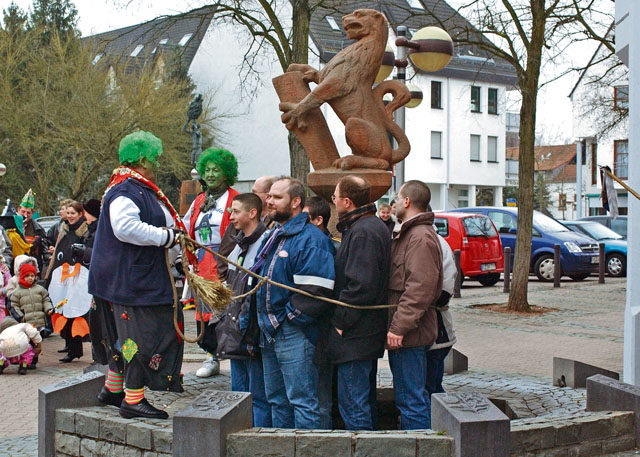
Females dressed as old women and witches storm town hall in Ramstein-Miesenbach at 11:11 a.m. each year on “Altweiberfasching.” Women in disguise will take the reigns Thursday.
Women in disguise will storm Ramstein-Miesenbach town hall at 11:11 a.m. Thursday to start “Altweiberfasching” celebrations. It’s one of the craziest days during Fasching season and literally translated it means “old women’s carnival.”
Altweiberfasching is always observed the Thursday before Rose Monday. Traditionally, females dress as old women or witches. They meet in the morning, walk down the streets, sing songs and storm the town halls in some communities. They constantly look for victims — men wearing ties. As soon as they see a man with a tie — on the street, in a store, in an office — they get out a pair of scissors and “attack” the man, which means they cut his tie. Men have to beware of women that day.
Depending on the area in which the tie cutting is performed, the woman might ask the man to either buy her a drink or lose the tie, or she cuts the tie and kisses the man. Women are allowed to act crazy that day and have fun without their “better halves.”
The tradition of women participating in Fasching goes back to the 15th century. During sermons, priests were complaining about the exchange of clothes between women and men. In 1558, the city council of Ueberlingen at Lake Constance was forced to prohibit women’s Fasching celebrations in female taverns and dormitories, because of women’s indecent behavior. But the women referred to their female rights such as drinking and dancing during specific Fasching days.
Altweiberfasching also marks the status of women in the 15th and 16th century. Wives had well-defined rights, since they were the budget keepers. During the crazy season they sat in judgment of other women who didn’t clean the house or didn’t take care of the children. Later, in several towns in Southern Germany, it became customary to sit in judgment of men. Women usually met in the conference rooms of town halls. That’s why nowadays women still storm the town halls on Altweiberfasching to take over control and become fully liberated as on no other day.
During the storming of the Ramstein-Miesenbach town hall, the women in disguise capture men in their offices, take them outdoors and tie them to the “Narrenbrunnen,” which is the “fool’s fountain.” Then the “Altweiber” cut the men’s ties and for the fee of at least €1.11, captives will be set free again.
Traditionally women who cut ties that day hang them up as trophies. And men don’t always notice the attack on time, because it’s not necessarily just women in disguise who do it, but also normally dressed females at work. Kill-joys won’t wear a tie that day or choose to wear an old one they don’t need any longer.
In some communities, the day will close out with Fasching parties and dances.
A big Altweiberfasching party with the band die Habachtaler will start at 8:11 p.m. Thursday at the Haus des Bürgers. Advance tickets are available at the ticket office in the Haus des Bürgers for €8; tickets at the door cost €10.
One of the most famous Altweiberfasching parties in the KMC will take place in the village of Niederkirchen. Doors to the party under the motto, “Ghostbusters — on mission in Niederkirchen,” will open at 7 p.m. Thursday in the local community hall, called Westpfalzhalle. The band Magic and a disc jockey will provide the dance music. Tickets at the door cost €15.
The Kaiserslautern carnival club KVK will start its traditional Altweiberfasching event at 7 p.m. in its club house, Kalause 11, Kaiserslautern.
Another Altweiberfasching dance party will start 8 p.m. Thursday in Erfenbach’s Kreuzsteinhalle.
The band Favorits will perform. Tickets cost €9. Men will be admitted free until 10 p.m.



